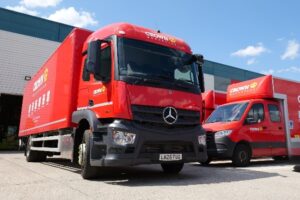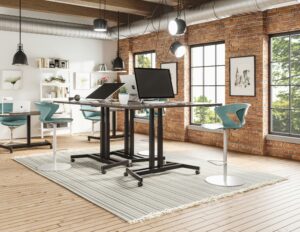The Future of Office Spaces: Is Hybrid Working Here to Stay?
Hybrid working has reshaped the modern workplace, offering employees flexibility and businesses new opportunities to rethink office spaces.
But as companies continue to evaluate their long-term strategies, the debate remains: Is hybrid working here to stay, or will we see a return to traditional office setups?
Written by Darren Nice

Head of Sales
Darren Nice is the Head of Sales for Crown Workspace in the UK and Ireland and has a vast amount of knowledge with over 30′ years experience in the office workspace industry.
Why Hybrid Working is Here to Stay
Employee Well-being and Productivity
Employees increasingly appreciate the flexibility of hybrid work, as the ability to work remotely, even part of the time, enables them to manage their schedules more effectively and reduces the fatigue associated with daily commuting.
Research shows that hybrid working enhances job satisfaction and well-being. A study by the International Workplace Group (IWG) found that 79% of employees feel less drained, 78% experience reduced stress, and 72% report improved mental health thanks to hybrid work arrangements (The Guardian).
Talent Attraction and Retention
 Hybrid working is becoming a key factor in employee retention, with employees increasingly prioritising a work-life balance.
Hybrid working is becoming a key factor in employee retention, with employees increasingly prioritising a work-life balance.
Offering hybrid working provides a competitive advantage for businesses looking to attract top talent.
Organisational Productivity

Despite initial concerns, hybrid models can boost efficiency. CIPD’s research indicates that 38% of organisations have seen increased productivity due to hybrid working, while only 13% have reported a decline. (CIPD)
Companies leveraging remote collaboration tools and flexible office arrangements are finding new ways to maintain efficiency and teamwork.
Health and Well-being Benefits

Beyond productivity, hybrid work arrangements contribute to employees’ overall well-being.
The IWG study found that 68% of employees reported better health, while 54% engaged in more exercise due to reduced commuting times.
Challenges to the Future of Hybrid Working
Pressure for Increased Office Presence

Despite its advantages, hybrid work is facing pushback from some corporations. Companies like Amazon have mandated a return to full-time office work, citing concerns over collaboration and creativity. As businesses reassess their post-pandemic policies, some are shifting towards more structured in-office expectations.
Impact on Organisational Culture
 While hybrid work fosters flexibility, it may also weaken employees’ connection to their company’s mission and values. According to CIPD, 21% of employers believe hybrid working negatively affects employees’ connection to organisational purpose, and 18% feel it makes it harder for managers to lead teams effectively.
While hybrid work fosters flexibility, it may also weaken employees’ connection to their company’s mission and values. According to CIPD, 21% of employers believe hybrid working negatively affects employees’ connection to organisational purpose, and 18% feel it makes it harder for managers to lead teams effectively.
Inclusion and Career Progression Concerns
 Hybrid working has also sparked concerns about workplace inequality.
Hybrid working has also sparked concerns about workplace inequality.
Employers worry that remote workers might face limited opportunities for career progression, with 39% citing concerns about unequal treatment. Employees who spend less time in the office may miss out on networking, mentoring, and career development opportunities.
Employee Well-being Challenges
 While hybrid working improves flexibility, it can also contribute to digital fatigue. Research indicates that frequent video calls lead to “Zoom fatigue,” with dissatisfaction over one’s appearance on camera contributing to exhaustion (The Times).
While hybrid working improves flexibility, it can also contribute to digital fatigue. Research indicates that frequent video calls lead to “Zoom fatigue,” with dissatisfaction over one’s appearance on camera contributing to exhaustion (The Times).
To maintain well-being, companies must adopt best practices for virtual collaboration and encourage employees to balance screen time with in-person interactions.
Conclusion: What’s Next for Hybrid Work?
The future of office spaces will be shaped by a blend of remote and in-office work. Hybrid models boost productivity and well-being, but businesses must tackle cultural and managerial challenges for long-term sustainability.
As organisations refine their strategies, hybrid work seems to be a lasting trend, dependent on how well companies address their challenges.
With expert support from Crown Workspace UK, companies can create flexible, sustainable, and productive hybrid workplaces. Get in touch today to learn how we can help your office space for the future.
Related stories
At Crown Workspace, our mission is clear: To deliver seamless workplace transformations across the UK. To achieve this efficiently, we rely on a robust, reliable, and safe fleet. That’s why we’re delighted to announce the latest expansion of our commercial vehicle fleet with the addition of 19 new Mercedes-Benz vehicles supplied by our long-standing partner […]
Around half of all Facilities Managers plan to downsize their office space in the next three years. How, and why?
Are offices getting bigger or smaller, and why? Let’s start with the conclusion: The honest answer is that both stories are true. Some organizations are taking up more and larger offices, others are compressing. What ties the two together is a single idea that now sits at the heart of Facilities Management: rightsizing. Size follows […]





























